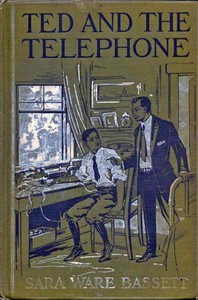Ted and the Telephone by Sara Ware Bassett (read the beginning after the end novel txt) 📗

- Author: Sara Ware Bassett
Book online «Ted and the Telephone by Sara Ware Bassett (read the beginning after the end novel txt) 📗». Author Sara Ware Bassett
CHAPTER X
WHAT CAME AFTERWARD
"Was that first telephone like ours?" inquired Ted later as, their lunch finished, they sat idly looking out at the river.
"Not wholly. Time has improved the first crude instrument," Mr. Hazen replied. "The initial principle of the telephone, however, has never varied from Mr. Bell's primary idea. Before young Watson tumbled into bed on that epoch-making night, he had finished the instrument Bell had asked him to have ready, every part of it being made by the eager assistant who probably only faintly realized the mammoth importance of his task. Yet whether he realized it or not, he had caught a sufficient degree of the inventor's excitement to urge him forward. Over one of the receivers, as Mr. Bell directed, he mounted a small drumhead of goldbeater's skin, joined the center of it to the free end of the receiver spring, and arranged a mouthpiece to talk into. The plan was to force the steel spring to answer the vibrations of the voice and at the same time generate a current of electricity that should vary in intensity just as the air varies in density during the utterance of speech sounds. Not only did Watson make this instrument as specified, but in his interest he went even farther, and as the rooms in the loft seemed too near together, the tireless young man ran a special wire from the attic down the two flights of stairs to the ground floor of the shop and ended it near his workbench at the rear of the building, thus constructing the first telephone line in history.
"Then the next day Mr. Bell came to test out his invention and, as you can imagine, there was great excitement."
"I hope it worked," put in Laurie.
"It worked all right although at this early stage of the game it was hardly to be expected that the instrument produced was perfect. Nevertheless, the demonstration proved that the principle behind it was sound and that was all Mr. Bell really wanted to make sure of. Watson, as it chanced, got far more out of this initial performance than did Mr. Bell himself for because of the inventor's practical work in phonics the vibrations of his voice carried more successfully than did those of the assistant. Yet the youthful Watson was not without his compensations. Nature had blessed him with unusually acute hearing and as a result he could catch Bell's tones perfectly as they came over the wire and could almost distinguish his words; but shout as he would, poor Mr. Bell could not hear him. This dilemma nevertheless discouraged neither of them for Watson had plenty of energy and was quite willing to leap up the two flights of stairs and repeat what he had heard; and this report greatly reassured Mr. Bell, who outlined a list of other improvements for another telephone that should be ready on the following day."
"I suppose they kept remodelling the telephones all the time after that, didn't they?" inquired Ted.
"You may be sure they did," was Mr. Hazen's response. "The harmonic telegraph was entirely sidetracked and the interest of both men turned into this newer channel. Mr. Bell, in the meantime, was giving less and less energy to his teaching and more and more to his inventing. Before many days the two could talk back and forth and hear one another's voices without difficulty, although ten full months of hard work was necessary before they were able to understand what was said. It was not until after this long stretch of patient toil that Watson unmistakably heard Mr. Bell say one day, 'Mr. Watson, please come here, I want you.' The message was a very ordinary, untheatrical one for a moment so significant but neither of the enthusiasts heeded that. The thrilling fact was that the words had come clear-cut over the wire."
"Gee!" broke in Laurie.
"It certainly must have been a dramatic moment," Mr. Hazen agreed. "Mr. Bell, now convinced beyond all doubt of the value of his idea, hired two rooms at a cheap boarding-house situated at Number 5 Exeter Place, Boston. In one of these he slept and in the other he equipped a laboratory. Watson connected these rooms by a wire and afterward all Mr. Bell's experimenting was done here instead of at the Williams's shop. It was at the Exeter Place rooms that this first wonderful message came to Watson's ears. From this period on the telephone took rapid strides forward. By the summer of 1876, it had been improved until a simple sentence was understandable if carefully repeated three or four times."
"Repeated three or four times!" gasped Laurie in dismay.
The tutor smiled at the boy's incredulousness.
"You forget we are not dealing with a finished product," said he gently. "I am a little afraid you would have been less patient with the imperfections of an infant invention than were Bell and Watson."
"I know I should," was the honest retort.
"The telephone was a very delicate instrument to perfect," explained Mr. Hazen. "Always remember that. An inventor must not only be a man who has unshaken faith in his idea but he must also have the courage to cling stubbornly to his belief through every sort of mechanical vicissitude. This Mr. Bell did. June of 1876 was the year of the great Centennial at Philadelphia, the year that marked the first century of our country's progress. As the exhibition was to be one symbolic of our national development in every line, Mr. Bell decided to show his telephone there; to this end he set Watson, who was still at the Williams's shop, to making exhibition telephones of the two varieties they had thus far worked out."
"I'll bet Watson was almighty proud of his job," Ted interrupted.
"I fancy he was and certainly he had a right to be," answered Mr. Hazen. "I have always been glad, too, that it fell to his lot to have this honor; for he had worked long and faithfully, and if there were glory to be had, he should share it. To his unflagging zeal and intelligence Mr. Bell owed a great deal. Few men could so whole-heartedly have effaced their own personality and thrown themselves with such zest into the success of another as did Thomas Watson."
The tutor paused.
"Up to this time," he presently went on, "the telephones used by Bell and Watson in their experiments had been very crude affairs; but those designed for the Centennial were glorified objects. Watson says that you could see your face in them. The Williams's shop outdid itself and more splendid instruments never went forth from its doors. You can therefore imagine Watson's chagrin when, after highly commending Mr. Bell's invention, Sir William Thompson added, 'This, perhaps, greatest marvel hitherto achieved by electric telegraph has been obtained by appliances of quite a homespun and rudimentary character.'"
Both Ted and Laurie joined in the laughter of the tutor.
"And now the telephone was actually launched?" Ted asked.
"Well, it was not really in clear waters," Mr. Hazen replied, with a dubious shrug of his shoulders, "but at least there was no further question as to which of his schemes Mr. Bell should perfect. Both Mr. Hubbard and Mr. Saunders, who were assisting him financially, agreed that for the present it must be the telephone; and recognizing the value of Watson's services, they offered him an interest in Mr. Bell's patents if he would give up his work at Williams's shop and put in all his time on this device. Nevertheless they did not entirely abandon the harmonic telegraph for Bell's success with the other invention had only served to strengthen their confidence in his ability and genius. It was also decided that Mr. Bell should move from Salem to Boston, take an additional room at the Exeter Place house (which would give him the entire floor where his laboratory was), and unhampered by further teaching plunge into the inventive career for which heaven had so richly endowed him and which he loved with all his heart. You can picture to yourselves the joy these decisions gave him and the eagerness with which he and Watson took up their labors together.
"They made telephones of every imaginable size in their attempts to find out whether there was anything that would work more satisfactorily than the type they now had. But in spite of their many experiments they came back to the kind of instrument with which they had started, discovering nothing that was superior to their original plan. Except that they compelled the transmitter to do double duty and act also as a receiver, the telephone that emerged from these many tests was practically similar in principle to the one of to-day."
"Had they made any long-distance trials up to this time?" questioned Laurie.
"No," Mr. Hazen admitted. "They had lacked opportunity to make such tests since no great span of wires was accessible to them. But on October 9, 1876, the Walworth Manufacturing Company gave them permission to try out their device on the Company's private telegraph line that ran from Boston to Cambridge. The distance to be sure was only two miles but it might as well have been two thousand so far as the excitement of the two workers went. Their baby had never been out of doors. Now at last it was to take the air! Fancy how thrilling the prospect was! As the wire over which they were to make the experiment was in use during the day, they were forced to wait until the plant was closed for the night. Then Watson, with his tools and his telephone under his arm, went to the Cambridge office where he impatiently listened for Mr. Bell's signal to come over the Morse sounder. When he had heard this and thereby made certain that Bell was at the other end of the line, he cut out the sounder, connected the telephone he had brought with him, and put his ear to the transmitter."
The hut was so still one could almost hear the breathing of the lads, who were listening intently.
"Go on!" Laurie said quickly. "Tell us what happened."
"Nothing happened!" answered the tutor. "Watson listened but there was not a sound."
"Great Scott!"
"The poor assistant was aghast," went on Mr. Hazen. "He was at a complete loss to understand what was the matter. Could it be that the contrivance which worked so promisingly in the Boston rooms would not work under these other conditions? Perhaps an electric current was too delicate a thing to carry sound very far. Or was it that the force of the vibration filtered off at each insulator along the line until it became too feeble to be heard? All these possibilities flashed into Watson's mind while at his post two miles away from Mr. Bell he struggled to readjust the instrument. Then suddenly an inspiration came to his





Comments (0)